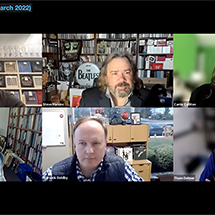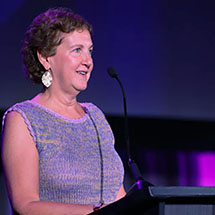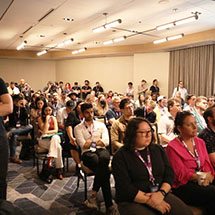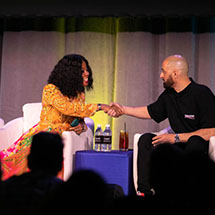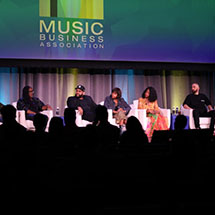
NARM and digitalmusic.org Become The Music Business Association

Six Sectors Established to Reflect Larger Agenda; Board Representation Expanded
October 7, 2013 – Starting today, NARM (National Association of Recording Merchandisers) and its digital industry hub digitalmusic.org will collectively be known as the Music Business Association (MusicBiz.org), to fully encompass everyone involved in music commerce in the United States. Six sectors have been established to drive specific areas of interest, and six new director positions have been added to the Board of the trade organization to represent this broader membership. The organization will continue to be headed by President Jim Donio, and the current team will remain headquartered in Marlton, NJ.
“The music industry has changed dramatically over the past decade, and NARM has been evolving along with those changes, bringing in more voices from the online and mobile industries with the creation of digitalmusic.org, as well as from other areas that were not traditionally associated with music retail,” said Donio. “More segments of the business than ever before now play an active role in the commerce side of the business, so the name ‘National Association of Recording Merchandisers’ no longer reflected everyone who can participate in the organization. ‘The Music Business Association’ makes it crystal clear – and for the first time in the organization’s history, the ‘M’ stands for music.”
“Jim has done a remarkable job in remaking NARM and driving the inclusion of the digital companies, first with introducing Digital NARM at the 2007 convention, then progressing to the hire of Bill Wilson in 2009, and establishing digitalmusic.org in 2011. But we always knew we were going to need to take a more dramatic move to go beyond categories like ‘physical’ and ‘digital’ and redefine the organization as a whole,” said Rachelle Friedman, Music Business Association Chairman of the Board and CEO of J&R Music & Computer World. “NARM was founded in 1958, the same year as the introduction of the first stereo LP. The Beatles had not even formed yet. Our organization has grown with the music business, and it’s time that our identity reflects that. Everyone in the commercial music industry is an equal partner, with seats at the table to come up with innovative solutions for the business as a whole.”
“The sector concept builds on the structure we created with the digitalmusic.org Work Groups, with members getting actively involved in the issues that are important to them and drive their bottom line,” said Bill Wilson, Vice President of Digital Strategy and Business Development, The Music Business Association. “Each group will work directly with the Music Biz team, including Director of Digital Strategy and Community Robby Towns and Business Development Consultant Cindy Charles, to determine their priorities and deliver results that move the needle for their area of the industry.”
Activity Sectors
The Music Business Association will be organized into a number of activity-specific sectors, very similar to the structure of digitalmusic.org’s task-specific Work Groups. The Sectors are designed to allow members to focus their activities and interests in areas that are relevant to their particular business functions and needs. Six Sectors have been identified, and the organization will initially focus on structuring the following four:
- Digital Sector: Will focus primarily on seamless transition of the current digitalmusic.org Work Groups Business Development, Subscription, Direct-to-Fan, and Digital Marketing.
Co-Chairs: Christina Calio, Microsoft, and Kevin Arnold, OpenAura
- Work Groups:
- Business Development
Mission: To accelerate innovation in the field of digital music by reducing barriers to entry for startups, entrepreneurs and others interested in creating digital products and services around music.
Co-chairs Bill Wilson and Cindy Charles of Music Biz - Digital Marketing
Mission: To coordinate best practices for direct marketing and CRM for an artist web site or network of artist websites, such as tools, platforms and strategic integrations that utilize the artist site(s) as the hub for activity.
Co-chairs Chuck Fishman, Acquia, and Lee Hammond, Universal - Subscription Services
Mission: Advocating the business of On-Demand music streaming and subscription services.
Chair: Jack Isquith, Slacker
- Business Development
- Information Technology Sector: Provide a forum for education, promotion and creation of information technology initiatives for the music industry. For members whose work is primarily focused on digital operations, data integrity and strategic integrations.
Co-Chairs: Robby Towns and Bill Wilson of Music Biz
- Work Groups:
- Digital Supply Chain & Operations
Mission: To streamline digital operations in the content supply chain and reporting process, including style guide standards, product database, takedown and rights revocation issues, rights collision management, and the like.
Co-chairs: Chris Read, Sony DADC, and Shachar Oren, Neurotic Media
- Digital Supply Chain & Operations
- Digital Asset Management
Mission: To coordinate and standardize all non-recorded music assets relevant to the digital music value chain, such as artist images, credits, liner notes, archival assets, and more.
Co-chairs: Maureen Droney, The Recording Academy, and Paul Jessop, County Analytics
- Physical Sector: Will advance the interests of all types of physical commerce (retail and wholesale), and foster initiatives designed to promote sales of all forms of physical product, regardless of where it is sold. Preliminary topics on the agenda include data-centric initiatives such as improving sales reporting and helping retailers exploit comparable sales data; opportunities in music DVD; issues around third party fulfillment; keeping CDs in print and manufacturing on demand; expanding catalog offerings in vinyl; packaging; e-commerce best practices, and Record Store Day.
Co-Chair: Mike Fratt, Homer’s, and Ryan Redington, Amazon
- Knowledge Sector: Will encompass areas including events, published material and research, education funding, and their related Work Groups.
Co-Chairs: Jim Donio and Nicole Hennessey of Music Biz
- The other two sectors are the Artists, Management, Touring Sector and the Legal & Business Affairs Sector. Both represent growing segments of Music Biz’s membership, and the organization had already provided programming of interest to professionals in these areas, including the Artist Managers Town Hall at the annual Music Biz event and our Entertainment and Technology Law Conference Series that takes place twice a year. These sector’s agendas and leadership will be announced in 2014.
Board Representation
The current members of the Board of Directors will remain in place, and six new seats have been added. Four of those new directors come from the former NARM Music Industry Advisory Council members. They are:
- Brad Navin, The Orchard
- Darren Stupak, Sony Music Entertainment
- Matt Signore, Warner Music Group
- Jim Urie, Universal Music Group
They join:
- Rachelle Friedman, J&R Music World – Chairman
- Brent Muhle, iTunes – Vice Chairman
- John Trickett, immergent – Treasurer
- Christina Calio, Microsoft
- Len Cosimano, Director-at-Large
- Mike Fratt, Homer’s
- Steve Harkins, Baker & Taylor
- Anthony Montenegro, Nokia
- Bruce Ogilvie, Super D/Alliance Entertainment
- Dilyn Radakovitz, Dimple Records
- Ryan Redington, Amazon
- Steve Savoca, Spotify
Two more directors representing music content companies are expected to be appointed by the end of the year.
Membership
Music Biz is primarily funded by its annual membership dues. Membership is open to every level of the industry, from individuals to major corporations, with special rates for students and startups. For established businesses, rates are determined by total annual U.S. revenue, starting at $595 for those with less than $1 million. All employees of a Music Biz member company are entitled to all of the member benefits, including discounted rates to the organization’s events. A pre-revenue, unfunded startup can join for $99. In addition, an individual not affiliated with a larger company, such as a lawyer or self-employed consultants, can join for $160, and student membership is $30. More information on joining Music Biz can be found on the website musicbiz.org.

